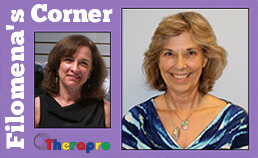
June Smith, OTR/L’s May 4th seminar entitled: Integrated Learning Concepts: Practical Strategies to Promote Reflex Integration with Postural/Ocular-Motor Based Learning clearly demonstrated how integration of primitive reflexes provides a foundation for the development of postural and ocular motor skills that affect learning.
June has broad experience as an occupational therapist and has an insatiable appetite for learning. As evidenced in her presentation, she is able to skillfully apply what she has learned to her practice. Many attendees noted how beautifully June weaves her knowledge and experience into her practice to develop innovative, effective treatment strategies. She is a collaborative therapist who enjoys sharing her passion with others. Currently, she is a clinician and mentor at South Shore Therapies, a private sensory integration clinic in Massachusetts. She has developed a Vision Clinic with Developmental Optometrists to promote visual efficiency in those with learning challenges. June has lectured nationally on Brain Gym ® and Integrated Learning concepts.
Four primitive reflexes were discussed in depth today: Moro Reflex, Tonic Labyrinthine Reflex (TLR), Symmetrical Tonic Neck Reflex (STNR), and the Asymmetrical Tonic Neck Reflex (ATNR). June provided general guidelines to determine when a primitive reflex is adaptive and when it is maladaptive. She discussed treatment considerations relevant to each primitive reflex. It was helpful that June had many clinical examples through videos/photos showing how primitive reflexes that are not fully integrated manifest themselves in children and videos/photos of treatment strategies that help integrate the reflexes. Throughout her talk, she drew from her Brain Gym® training, Svetlana Masgutova (Reflex Integration-MNRI), Sheila Frick, and others.
For a child who displays the TLR reflex long after it is typically integrated, June said we may see a host of associated behaviors such as the Moro Reflex where the child is toe walking due to an excessive extensor pattern; saccadic eye movements with reading difficulties; a poor sense of direction, developmental coordination disorder (DCD), Postural Ocular Disorders; hypersensitivity to vestibular activity where the child has motion sickness, dislikes gym class, and/or may have gastrointestinal issues; and has difficulty with extension prone or with neck flexion in supine. In general the child has poor balance of extension and flexion when the reflex is not integrated. Her treatment strategies include “going with the reflex” with fluid movement and gradually adding demands as tolerated, and finally working “against” the reflex. June’s treatment suggestions included activities involving facilitating head movement in all planes, linear vestibular input, using an 18″ Gymnic ball in 90/90 hip and knee flexion, and activation of the vestibular system.
June’s suggestions for therapeutic and reading materials include Rappin’ on the Reflexes: A Practical Guide to Infant Reflexes; See It. Say It. Do It!, whose author is a Developmental Optometrist; Developing Ocular Motor and Visual Perceptual Skills; and Understanding and Managing Vision Deficits: A Guide for Occupational Therapists, 3rd Ed.
June is a vibrant, generous, and gifted speaker whose knowledge and clinical expertise is extensive. She makes the application of what she has learned to the clinical setting seamless. Encouraged by June, attendees eagerly shared treatment strategies from their own clinical experiences. June’s audience was energized by her discussion and walked away with new treatment tools for immediate use!
Comments from attendees were very positive:
“Video and picture examples, interactive, and great descriptions of treatment activities/considerations.” – Kristina C., Occupational Therapist
“Great crash course in identifying and integrating reflexes. It is easily integrated into my own practice. For a complicated topic, very effortlessly presented.” – Hannah D., Occupational Therapist
“As an OT student this seminar was a great learning opportunity.” – Paige H., OTS
“Great introduction to topic – makes me feel like I want more!” – Anonymous, Occupational Therapist
Thank you, June!
Filomena Connor, MS, OTR/L
May 4, 2019
